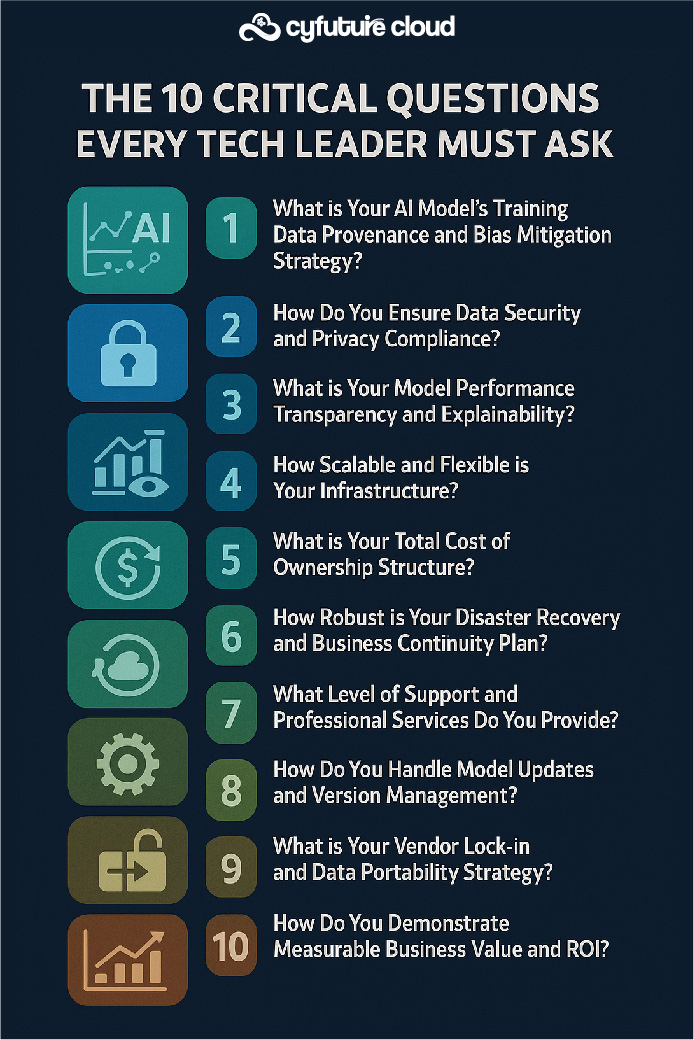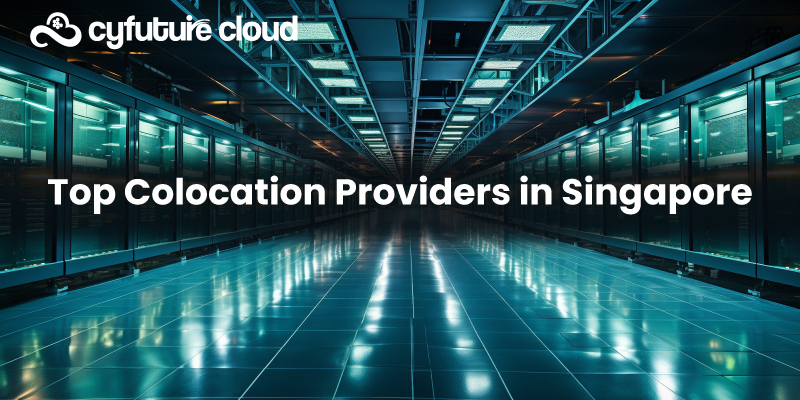Table of Contents
- What is AI As A Service (AIaaS)?
- The 10 Critical Questions Every Tech Leader Must Ask
- 1. What is Your AI Model’s Training Data Provenance and Bias Mitigation Strategy?
- 2. How Do You Ensure Data Security and Privacy Compliance?
- 3. What is Your Model Performance Transparency and Explainability?
- 4. How Scalable and Flexible is Your Infrastructure?
- 5. What is Your Total Cost of Ownership Structure?
- 6. How Robust is Your Disaster Recovery and Business Continuity Plan?
- 7. What Level of Support and Professional Services Do You Provide?
- 8. How Do You Handle Model Updates and Version Management?
- 9. What is Your Vendor Lock-in and Data Portability Strategy?
- 10. How Do You Demonstrate Measurable Business Value and ROI?
- How Cyfuture Cloud Simplifies Your AI Provider Decision
- The AI Provider Evaluation Checklist
- Industry-Specific Considerations
- Future-Proofing Your AI Investment
- Transform Your AI Strategy with Strategic Provider Selection
- Frequently Asked Questions (FAQs)
- 1. How long should an AI provider evaluation process take?
- 2. What percentage of my AI budget should go toward the provider vs. internal resources?
- 3. How do I evaluate the quality of an AI provider’s training data?
- 4. What are the most common AI implementation failures and how can I avoid them?
- 5. How do I assess an AI provider’s long-term viability?
- 6. What should I do if my chosen AI provider doesn’t meet performance expectations?
- 7. How do I ensure my AI implementation complies with evolving regulations?
- 8. What are the key differences between cloud-based and on-premises AI solutions?
- 9. How do I calculate the ROI of an AI implementation?
Were you searching for the most critical questions to ask when evaluating AI As A Service providers for your organization?
Choosing the right AI As A Service (AIaaS) provider is one of the most crucial technology decisions your organization will make in 2025. With the global AI market projected to reach $638.23 billion in 2025 and grow to $3,680.47 billion by 2034, selecting the wrong provider can cost your business millions in lost opportunities, security breaches, and operational inefficiencies.
The stakes have never been higher. Here’s the reality:
- More than 75% of companies are either using or exploring the use of AI in their businesses
- More than 80% of employers consider AI a top priority in their future business plans
- The software as a service (SaaS) segment dominated in 2024 with a market share of around 46%
Yet most organizations rush into AI partnerships without asking the right questions.

What is AI As A Service (AIaaS)?
AI As A Service (AIaaS) is a cloud-based delivery model that provides artificial intelligence capabilities, tools, and infrastructure through third-party providers without requiring organizations to build and maintain their own AI infrastructure. This model allows businesses to access machine learning algorithms, natural language processing, computer vision, and other AI technologies on a subscription or pay-per-use basis.
Machine learning (ML) segment leads the market with the largest revenue share of 40.7% in 2024, due to its ability to analyze vast datasets, making it the most sought-after AIaaS capability.
The 10 Critical Questions Every Tech Leader Must Ask

1. What is Your AI Model’s Training Data Provenance and Bias Mitigation Strategy?
This isn’t just about compliance—it’s about protecting your organization’s reputation and ensuring ethical AI deployment.
Why This Matters:
- Biased training data leads to discriminatory outcomes
- Poor data provenance creates legal liability
- Regulatory compliance is becoming mandatory globally
Questions to Ask:
- How do you source and validate training data?
- What bias detection and mitigation techniques do you employ?
- Can you provide documentation of your data governance practices?
- How do you handle sensitive or protected category data?
“The quality of AI output is directly proportional to the quality and ethics of its training data. Ask the hard questions about bias—your brand depends on it.” – Tech Industry Expert on Quora
Cyfuture Cloud’s Approach: Cyfuture Cloud implements comprehensive data governance frameworks that include bias testing protocols, ethical AI guidelines, and transparent data sourcing practices, ensuring your AI deployments maintain the highest standards of fairness and compliance.
2. How Do You Ensure Data Security and Privacy Compliance?
With 47% of organizations experiencing at least one AI-related consequence, security cannot be an afterthought.
Critical Security Questions:
- What encryption standards do you use for data in transit and at rest?
- How do you handle data residency requirements?
- What certifications do you maintain (SOC2, ISO 27001, GDPR, HIPAA)?
- How do you prevent data leakage between different client environments?
- What is your incident response procedure for security breaches?
Key Security Metrics to Demand:
- 99.9%+ uptime SLA
- End-to-end encryption (AES-256 minimum)
- Multi-factor authentication
- Role-based access controls
- Regular security audits and penetration testing
3. What is Your Model Performance Transparency and Explainability?
Black box AI is no longer acceptable for enterprise applications.
Performance Transparency Requirements:
- Model accuracy metrics across different use cases
- Confidence scores and uncertainty quantification
- Performance degradation monitoring
- A/B testing capabilities
- Real-time performance dashboards
Questions About Explainability:
- Can your models provide reasoning for their decisions?
- How do you handle regulatory requirements for AI explainability?
- What tools do you provide for model interpretation?
- How granular is your explanation capability?
4. How Scalable and Flexible is Your Infrastructure?
The global AI software market is forecast to reach $174.1 billion in 2025 and grow at a CAGR of 25% through 2030. Your provider must scale with this growth.
Infrastructure Scalability Questions:
- What is your auto-scaling capability?
- How do you handle sudden traffic spikes?
- What are your resource allocation limits?
- How do you ensure consistent performance during scaling?
- What geographic regions do you support?
Integration and Flexibility:
- API compatibility and documentation quality
- SDK availability for major programming languages
- Webhook and event-driven architecture support
- Custom model deployment capabilities
- Multi-cloud deployment options
5. What is Your Total Cost of Ownership Structure?
Hidden costs can destroy your AI ROI. Demand complete transparency.
Cost Structure Analysis:
- Base subscription fees vs. usage-based pricing
- Data ingestion and storage costs
- API call pricing tiers
- Custom model training fees
- Support and professional services costs
- Exit costs and data portability fees
ROI Calculation Framework: Request detailed case studies showing:
- Implementation timeline and costs
- Performance improvements achieved
- Cost savings generated
- Resource optimization benefits
“Most organizations underestimate AI implementation costs by 200-300%. Always ask for detailed TCO projections including hidden fees.” – Reddit AI Community Discussion
6. How Robust is Your Disaster Recovery and Business Continuity Plan?
System failures can cost enterprises millions per hour of downtime.
Business Continuity Questions:
- What is your RTO (Recovery Time Objective) and RPO (Recovery Point Objective)?
- How do you handle multi-region failover?
- What backup and disaster recovery testing do you perform?
- How do you communicate during service disruptions?
- What compensation do you provide for SLA breaches?
Redundancy Requirements:
- Multi-zone deployment architecture
- Automated failover mechanisms
- Real-time data replication
- Load balancing and traffic management
- Disaster recovery testing frequency
7. What Level of Support and Professional Services Do You Provide?
Implementation success depends heavily on support quality and expertise.
Support Structure Evaluation:
- 24/7 technical support availability
- Response time SLAs by severity level
- Dedicated customer success managers
- Implementation and onboarding services
- Training and certification programs
Professional Services Capabilities:
- Custom model development
- Integration consulting
- Performance optimization
- Change management support
- Industry-specific expertise
8. How Do You Handle Model Updates and Version Management?
AI models require continuous updates, but changes can break existing integrations.
Version Management Questions:
- How frequently do you update models?
- What is your backward compatibility policy?
- How do you communicate breaking changes?
- What testing and validation processes do you use?
- Can clients control update timing?
Change Management Process:
- Beta testing programs
- Gradual rollout mechanisms
- Rollback procedures
- Impact assessment protocols
- Client notification systems
9. What is Your Vendor Lock-in and Data Portability Strategy?
Avoid getting trapped with a single provider—maintain your strategic flexibility.
Data Portability Requirements:
- Standard data export formats (JSON, CSV, XML)
- Complete model and training data access
- API compatibility with industry standards
- Migration assistance and tools
- Reasonable exit timelines
Vendor Independence Questions:
- Can you deploy models on-premises or other clouds?
- What open-source alternatives exist?
- How do you ensure client data ownership?
- What are the contractual exit procedures?
- Do you support hybrid deployments?
10. How Do You Demonstrate Measurable Business Value and ROI?
The most sophisticated AI is worthless without clear business impact.
Value Demonstration Framework:
- Pilot program structures and success metrics
- Industry-specific use case examples
- Quantified business outcomes from existing clients
- Performance benchmarking against competitors
- Long-term value realization timelines
ROI Metrics to Track:
- Process automation savings
- Decision accuracy improvements
- Customer satisfaction increases
- Revenue generation enhancements
- Operational efficiency gains
“The best AI vendors don’t sell technology—they sell business outcomes. Always demand proof of measurable value.” – Enterprise AI Leader on Twitter
How Cyfuture Cloud Simplifies Your AI Provider Decision
Cyfuture Cloud eliminates the complexity of AI provider evaluation by providing:
Transparent Excellence: Complete visibility into model performance, security practices, and cost structures from day one.
Enterprise-Grade Security: SOC2 Type II compliance, end-to-end encryption, and comprehensive data governance frameworks that exceed industry standards.
Scalable Infrastructure: Auto-scaling cloud infrastructure that grows with your business needs, supporting everything from startup pilots to enterprise-scale deployments.
Proven ROI: Cyfuture Cloud clients typically achieve 40% faster implementation times and 60% better cost efficiency compared to traditional AI vendors, with dedicated success managers ensuring measurable business outcomes.
The AI Provider Evaluation Checklist
Use this comprehensive checklist when evaluating potential providers:
Technical Capabilities:
- Model accuracy meets your requirements
- API performance and reliability standards
- Integration complexity and timeline
- Scalability and infrastructure robustness
Security and Compliance:
- Required certifications and standards
- Data encryption and privacy controls
- Compliance with industry regulations
- Incident response procedures
Business Alignment:
- Total cost of ownership analysis
- Contract terms and flexibility
- Support and professional services
- Long-term strategic partnership potential
Risk Management:
- Disaster recovery capabilities
- Vendor financial stability
- Technology roadmap alignment
- Exit strategy and data portability
Industry-Specific Considerations
Healthcare and Life Sciences
- HIPAA compliance mandatory
- FDA validation requirements
- Clinical trial data handling
- Patient privacy protections
Financial Services
- SOX compliance requirements
- Real-time fraud detection needs
- Regulatory reporting capabilities
- Risk management integration
Retail and E-commerce
- Customer behavior analytics
- Inventory optimization
- Personalization engines
- Omnichannel integration
Manufacturing
- Predictive maintenance capabilities
- Quality control automation
- Supply chain optimization
- IoT device integration
Future-Proofing Your AI Investment
Consider these emerging trends when evaluating providers:
Multimodal AI Capabilities: The AI market is expected to show an annual growth rate (CAGR 2025-2030) of 27.67%, driven largely by multimodal solutions that combine text, image, and audio processing.
Edge AI Integration: Ensure your provider supports edge deployment for latency-sensitive applications.
Quantum-Ready Infrastructure: Look for providers investing in quantum-resistant security and quantum computing capabilities.
Sustainable AI Practices: Environmental impact and carbon footprint considerations are becoming critical selection criteria.
Transform Your AI Strategy with Strategic Provider Selection
The AI revolution isn’t coming—it’s here. Organizations that make strategic AI provider decisions today will dominate their markets tomorrow.
The companies winning with AI aren’t necessarily the ones with the biggest budgets or the most technical expertise. They’re the ones asking the right questions, demanding transparency, and choosing partners who align with their long-term strategic vision.
Don’t let your organization fall behind because of poor vendor selection. Use these 10 essential questions to evaluate AI providers systematically, prioritize business value over flashy features, and build AI capabilities that drive sustainable competitive advantage.
The future belongs to organizations that embrace AI strategically. Make sure yours is one of them.

Frequently Asked Questions (FAQs)
1. How long should an AI provider evaluation process take?
A thorough AI provider evaluation should take 6-12 weeks, including pilot testing, security reviews, and stakeholder alignment. Rushing this process often leads to costly mistakes.
2. What percentage of my AI budget should go toward the provider vs. internal resources?
Industry best practice suggests a 60/40 split: 60% for the AI provider (including platform, support, and professional services) and 40% for internal resources (staff, training, and integration costs).
3. How do I evaluate the quality of an AI provider’s training data?
Request detailed data provenance documentation, bias testing results, and examples of how they handle edge cases. Quality providers will readily share this information.
4. What are the most common AI implementation failures and how can I avoid them?
The top failure modes are insufficient change management (40%), poor data quality (35%), and inadequate security planning (25%). Address these through comprehensive planning and stakeholder engagement.
5. How do I assess an AI provider’s long-term viability?
Evaluate their financial stability, technology roadmap, client retention rates, and strategic partnerships. Look for providers with diverse revenue streams and strong market positions.
6. What should I do if my chosen AI provider doesn’t meet performance expectations?
Establish clear performance metrics and remediation procedures in your contract. Include penalty clauses for SLA breaches and maintain data portability rights for quick provider switching.
7. How do I ensure my AI implementation complies with evolving regulations?
Choose providers with dedicated compliance teams who actively monitor regulatory changes and provide regular updates. Ensure your contract includes compliance guarantee clauses.
8. What are the key differences between cloud-based and on-premises AI solutions?
Cloud-based solutions offer faster deployment, automatic scaling, and lower upfront costs but may have data sovereignty concerns. On-premises solutions provide greater control but require significant infrastructure investment.
9. How do I calculate the ROI of an AI implementation?
Focus on measurable business outcomes: cost reduction, revenue increase, process efficiency, and risk mitigation. Typical enterprise AI implementations show 15-25% ROI within 18 months.
Recent Post
Send this to a friend

 Server
Colocation
Server
Colocation CDN
Network
CDN
Network Linux
Cloud Hosting
Linux
Cloud Hosting Kubernetes
Kubernetes Pricing
Calculator
Pricing
Calculator
 Power
Power
 Utilities
Utilities VMware
Private Cloud
VMware
Private Cloud VMware
on AWS
VMware
on AWS VMware
on Azure
VMware
on Azure Service
Level Agreement
Service
Level Agreement 



















